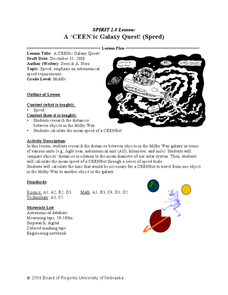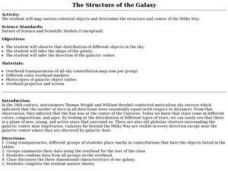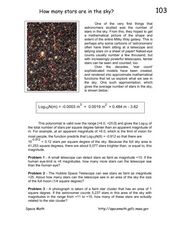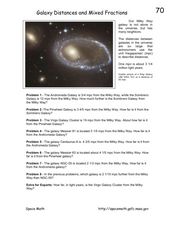Curated OER
A CEENic Galaxy Quest!
Students research the distances between objects in the Milky Way. In this astronomy lesson, students calculate the time it would take for a robot to travel from Milky Way object to another. They create a travel package for customers...
Curated OER
Galaxies and the Universe
If Earth was formed 4600 million years ago, and the sun revolves about the center of the Milky Way once every 250 million years, how many revolutions have occurred? Students answer this question and ten more, all providing students with...
Curated OER
The Speed of Galaxy Q2125-431
In this speed of a galaxy worksheet, students use a given equation for the speed of an object and they use the spectral lines for Hydrogen Alpha and Beta from the Seyfert galaxy to answer 6 questions. They determine the observed...
NASA
Discovering the Milky Way
What do you call a tiny collection of galaxies? A puny-verse! Young scholars graph data gathered by scientists studying Cepheids. They attempt to identify a relationship between the variables through standard and logarithmical graphing....
Curated OER
The Future of the Milky Way
Students brainstorm ideas about the future of our galaxy. In this space science lesson, students research the three main events happening in the Milky Way. They write a report about their findings.
Curated OER
Milky Way Galaxy
Pupils simulate stars in the Milky Way Galaxy using newspaper prints. In this space science lesson, students compare the number of 'stars' on their page to familiar things. They calculate how many pages they need to have the same number...
Curated OER
The Structure of the Galaxy
Students infer the galaxy shape. In this structure of the galaxy lesson plan students observe the distribution of objects in the sky and answer questions.
Curated OER
GED Vocabulary: Earth and Space Science
In this earth and space science GED worksheet, students complete a crossword puzzle given 7 clues about topics such as earthquakes, the Milky Way Galaxy and weathering and erosion. Students are given a word bank to use to complete the...
Curated OER
Our Home in the Milky Way
Young scholars gain appreciation of the vastness of our galaxy by viewing an applet about the Milky Way. Students hypothesize about how long it would take to get from Earth to Pluto.
Curated OER
Scale Activities
How do you put something as large as the universe in perspective? Use a series of scale experiments. Classmates collaborate around four experiments to examine the scale of the earth-moon system, our solar system, the Milky Way galaxy,...
Curated OER
Counting the Stars in Draco
In this counting stars worksheet, students construct a histogram for stars in a given star field using their apparent magnitude. Students answer 5 questions using their tabulated data and histogram to answer questions about the stars of...
NASA
The Drake Equation
In this Drake Equation worksheet, students read about how scientists can estimate the number of intelligent civilizations that may exist in our galaxy. Students answer 7 questions about the Drake Equation and they use the internet to...
Curated OER
How Many Stars are in the Sky?
In this star count activity, students solve three problems using a given polynomial and its logarithm to determine the number of stars in a given area.
Curated OER
Galaxies
In this galaxy worksheet, students use the galaxy fact worksheet to complete 18 fill in the blank questions about galaxy shape, sizes, and number of stars.
Curated OER
Our Place in Space
Third graders identify the different planets that make up the solar system. In this space science lesson, 3rd graders construct a scale model of the major planets. They explore their different unique features and dress up as planets.
Curated OER
The Solar Neighborhood within 17 Light Years!
In this distance between stars worksheet, students plot the distance between the sun and 11 other stars on a 2 dimensional grid using a protractor and a ruler. They determine the distances between various stars and they find the shortest...
Columbus City Schools
Moon Phase Mania
Now you see it, now you don't. Our moon seems to pull a disappearing act from time to time—but why? Take your seventh grade scientists above and beyond to discover the truth about the moon and the role it plays in Earth's little corner...
K5 Learning
The Sun and the Stars
How are the stars similar to the sun in our galaxy? Learn all about the solar system with a reading excerpt about the sun and the stars. Kids read an informational passage before they answer questions about reading comprehension,...
Kids Discover
Galaxies by KIDS DISCOVER
An e-magazine with kid-friendly informational text, vibrant visuals, and activities about galaxies.
Mrs. Sol's Class
Solar System Project
Finish or launch your unit on the solar system with a jigsaw project covering major celestial concepts such as the Milky Way Galaxy, asteroids, meteors, comets, Earth's moon, and, of course, all the planets. Learners start by writing...
American Museum of Natural History
What Do You Know About Astronomy
Develop an understanding of the universe. Learners answer 10 multiple choice questions about several topics in astronomy. Questions contain information about the age of the universe, gravitational attraction, galaxies, planets and comets...
Curated OER
Galaxies
Tenth graders explore the structure and content of galaxies. Through discussion, lab, and hands-on activities, they discover the general structure of the three types of galaxies as well as the effect they have on the structure and...
Curated OER
Estimating The Number Of Civilizations In The Milky Way Galaxy
Students estimate the number of civilizations in the galaxy by first estimating the number of craters on the Moon and then by performing estimates of multiple-variable systems culminating in the use of the Drake Equation.
Curated OER
Galaxy Distances and Mixed Fractions
In this galaxies and fractions instructional activity, students solve 8 problems involving the distances of galaxies from each other by using mixed fractions to solve each problem. They use the megaparsec as the unit of measurement.

























